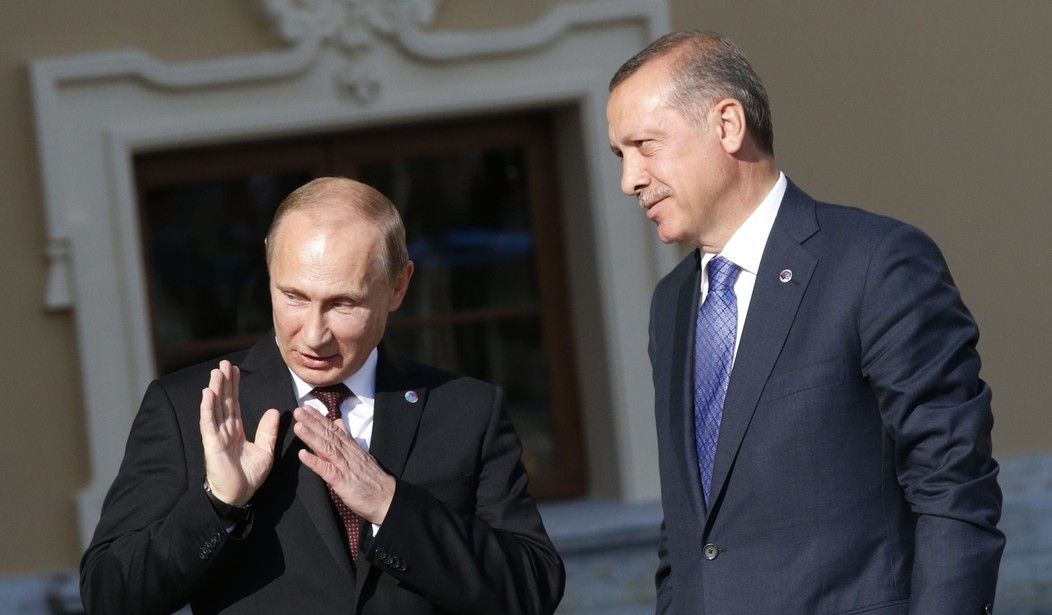After requesting meetings with Russian government officials for a week — and being rebuffed each time — Turkey finally got what it wanted yesterday: Russia’s foreign minister, Sergey Lavrov, met with his Turkish counterpart, Mevlüt Çavuşoğlu. If Turkey hoped the meeting would ease the crisis resulting from its shootdown of a Russian plane last plane, it was sorely disappointed:
In his annual state of the nation speech in the Kremlin, [Russian president] Putin stressed Russia is not planning to engage in military saber-rattling. “But if anyone thinks that having committed this awful war crime, the murder of our people, that they are going to get away with some measures concerning their tomatoes or some limits on construction and other sectors, they are sorely mistaken.”
Putin added that the Turks will regret “more than once” shooting down the Russian jet.
One of the ways in which Putin is punishing Turkey is by suspending talks on a planned Turkish gas pipeline:
The Turkish Stream project would see four pipelines carrying Russian natural gas under the Black Sea, linking southern Russia to western Turkey. This would allow Russia to achieve its goal of delivering gas to Europe while avoiding Ukraine. Russian President Vladimir Putin announced the plan for the Turkish Stream pipeline in December 2014, after Russia junked its South Stream joint venture with EU firms, which would have taken gas to southern Europe and Bulgaria.
Strikingly, almost every step taken by Putin against Turkey hurts both countries: a clear indication that Putin is dead serious. And he should be: if Turkey resists his foreign policy, other countries — especially in eastern Europe — might be encouraged to do the same. Since Russian foreign policy is based on fear and intimidation, Putin can’t allow that to happen. Meanwhile, Turkey is looking at Qatar and Azerbaijan for gas:
President Recep Tayyip Erdoğan and Prime Minister Ahmet Davutoğlu have traveled to key energy partners Qatar and Azerbaijan respectively this week in an effort to avert any economically damaging disruption in energy supplies as winter sets in.
This is the talk of the day here in Turkey. People are convinced they can save their economy by doing business with “our cousins in Azerbaijan” and “our friends in Qatar.” I’m less sure of that, although it might make Turkey less dependent on Russian gas — which will cost Putin dearly as well. The point is, Putin is willing to hurt his own nation’s economic interests as long as Turkey suffers too.
Another way Putin wants to make Turkey “regret” shooting down one of its bombers is by persecuting Turkish citizens in Russia. Yesterday, fifteen Turkish carpet factory workers were arrested in Rostov-on-Don, a town south of Moscow, near the Sea of Azov, despite having valid visas and working permits. The company involved is fighting back — as is the Turkish government — by arguing that Russia is violating international law. That might be true, but the dictatorial Putin couldn’t care less.
As Turkish President Erdogan well knows, since he too has a habit of arresting people who dare to disagree with him — or who are somehow, someway, associated with such people. Only recently, his forces detained journalists, police officers, and even military generals. He did that after tensions started flaring between him and Putin.
In short, Turkey is still trying to reach out Russia, but Putin is having none of it. At the same time it’s clear that Erdogan didn’t expect such an aggressive response over the decision to take down a Russian jet. The Turkish president is now scrambling both to save face and to limit the damage. It remains to be seen whether he’ll succeed.
This is a stand-off between two very similar men who have become absolute rulers over their respective nations, who brook no opposition, and who have a foreign policy aimed at spreading their countries’ influence and power. Given that, it’s unlikely that this crisis will be resolved any time soon.









Join the conversation as a VIP Member